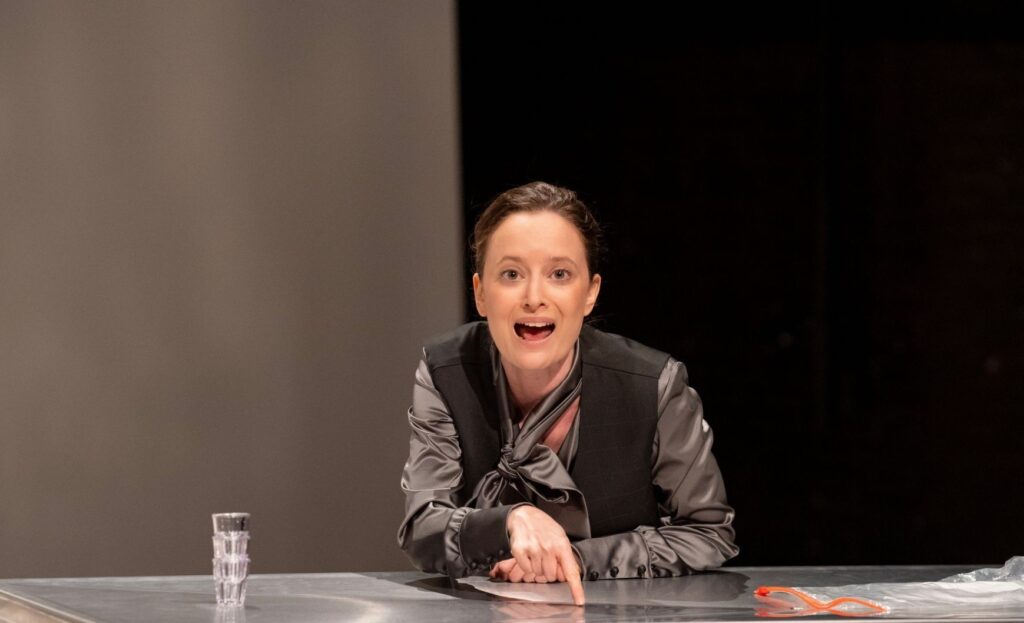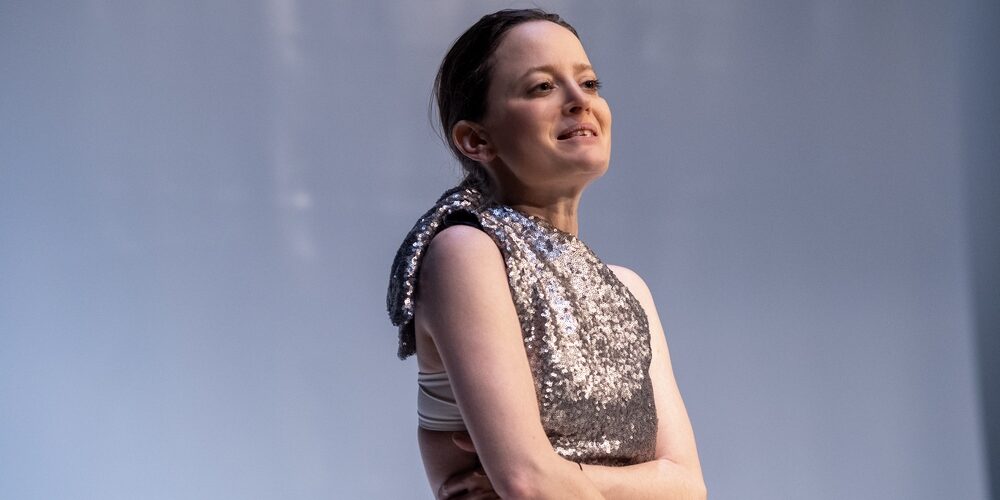Bitef Teatar, Belgrade. premiere 26th January 2024
Since Suzie Miller’s play Prima Facie premiered in Australia, it went on to be performed on Broadway and West End, where it got both a Tony and Olivier award. There have since been productions all across Europe. Belgrade audiences had the opportunity to see this acclaimed play in a production directed by Anja Suša at Bitef Teatar.
Prima Facie tells a story of the way victims of rape and sexual assault are treated by the legal system. In Serbia, we need this play more than ever. In the Serbian theatre scene we’re still dealing with the aftermath of the reporting the sexual abuse that started in 2021 when Milena Radulović reported that her acting teacher Miroslav Aleksić raped her when she was 17, and continued when Danijela Štajnfeld reported Branislav Lečić for rape. Lečić is still performing in Serbian theatres, since the allegations were officially declined by the courts.
This is the climate in which we watch this play that talks about a woman who, like Štajnfeld, and Radulović may not be everyone’s ‘ideal’ victim of sexual abuse. But then who is an ideal victim?
Tessa, the protagonist of Prima Facie, is an attractive, independent woman who had previously had a sexual relationship with her rapist. She is a lawyer who often defends those who committed crimes of sexual assault and who one day becomes a victim of rape herself. In that moment her whole value system is called into question. The play shows what is it like when your survival mechanism, your desire to not be hurt, makes you a part of a system that hurts people.
Played by Maša Dakić, Tessa lives a life completely dedicated to her career. However, we see a different side of Tessa when she comes to visit her mother and brother in her hometown. Via the violent behaviour of her brother, we see that she also had some experience of violence while growing up, which was one of the reasons she got used to life without love and close friends. Tessa starts to develop feelings for her colleague, Julian, with whom she had a sexual encounter in the office. She can admit this attraction to her only friend, Mia, her former colleague from the faculty of law who abandoned the law and became an actress.
Then, one night, Julian rapes Tessa when she’s too drunk to consent to sex, ignoring Tessa’s wish to not have intercourse when he wanted to. This changes things for her. She suddenly finds herself on the other side of a legal system that works for rapists better than for their victims. The title of the play Prima facie means “on first appearances“ – what appears to be true about some cases judging by the first look and on primary evidence. If somebody reports a rape and has no evidence of it, or if his evidence is declined, they don’t have a prima facie.
If they decide to report sexual violence, women have to go through a process of secondary victimization, making them relive the experience of the violent act, while the court and often the media try to catch them out. Miller’s play – she was a lawyer herself – show us the judging voices of the police, the court, Tessa’s colleagues.

Maša Dakić in Prima Face at Bitef Teatar
Dakić (a hero of Serbian girls’ childhoods, since she gave voice to all our favourite cartoon protagonists) portrays all the voices of this play all alone in her outstanding one-woman performance. She manages to induce laughter, fear, suspense, and tears. She switches between characters and gives a feeling that we have a whole ensemble in front of us and not only one talented actress. She speaks the lines of her rapist Julian, who gaslights her and abuses her, of the lawyer who interrogates her, of the police officer who shows no interest or empathy in her most vulnerable state. She transforms from a cold, nearly emotionless woman to the victim of violence, completely helpless, and then, transformed by her vulnerability, into a strong woman who doesn’t hide her wounds and emotions and fights for truth even though almost no one believes her. She yells, cries, argues, and seduces us by whispering into a microphone during the court speeches when she’s flirting with her co-worker; she goes through hell with her thoughts taped and replayed on the speakers, her internal monologue, her self-interrogation of her case.
In the scene leading up to the rape, we watch her dance in slow-motion to Coldplay’s Sky Full of Stars (stage movement by Damjan Kecojević). She wears a beautiful dress and is clearly drunk and/or high, but although the song is romantic, the moment is not – it is unpleasant, she is almost unconscious and it is obvious that Julian and she have no emotional connection. Eventually, she throws up. After the dance, he insists that they have sex, even though she repeats that she wants to wash her teeth. Then the rape happens, and the protagonists’ pain is very convincing both through Miller’s detailed monologue and Dakić’s solo performance.
The most powerful part of the play is the ending – in Tessa’s final speech. At the beginning of the play, she talks about her first day in Law school where the dean told the students to look left, then right to their colleagues – because only 1 in 3 of them will graduate, so they should prepare for competition for the elite position in society and success right now. This is how the protagonist paints the image of the law system in one short episode. At the end of Tessa’s final speech, she says to the audience – look left, look right, every third of us had experience of sexual abuse. This is the perfect arc of the protagonist’s change from fighting for win to fighting for empathy and meaning. Even though she lost this case in court, she got through one female police officer in the court, and she got through the audience. And she found meaning in fighting for real cause and for empathy.
Tessa’s final defence in the court was made from under a table like she’s in a box, her words interrupted. But although this was an audibly and visually interesting decision by Suša, the meaning was not clear – other than the fact it shows her inability to express herself without being interrupted, which was also clear in a dialogue with the lawyer. It was also a bit distracting for the audience as well, and stylistically completely different than the rest of the show.
Marija Mitrić’s scenography is minimal and sterile, with a white background, clear space, office chairs, a metal table, clothes rack with clothes and props in white cloth-like evidence bags with the label „evidence“ on it. In the end, Tessa puts one bag like that one on her head, like she’s going to suffocate.
The sterility is present in Tessa’s clothes as well (costumes: Maja Mirković). She wears elegant suits in which she looks powerful, and in the beginning, she even wears a male suit, a size bigger, with a tie, where it is clear that she is trying to fight in a men’s world, while underneath she is a vulnerable woman. We can see her changing her clothes into more feminine and comfortable clothes when she’s on her way to meet her mother, and when she goes out on her fatal date with Julian, she wears a beautiful dress, which will be cursed by the end of the show. She wears nothing but her underwear when she talks about her feelings with her friend Mia, or when she deals with the violence she survived – her tights are even visibly torn, and when she goes to the police to report the violence – she wears nothing but a big warm comfortable beige winter jacket in which she feels the warmest and most comfortable and doesn’t even care how she looks. And when the lawyer, publicity, and the judge tear her apart gaslighting her in court, she wears a suit jacket buttoned at the back.
What Miller’s play does so well is to point out the difference between the real truth and the truth in law. It shows the hypocrisy of the legal system in respect of rape cases and demands change. But it also shows us that even though there is no court win for Tessa, we can trust each other. This is why the real ending of the show happens after Tessa’s final speech when the audience intuitively applauds her, even though the show hasn’t officially ended.
After this moment, Tessa has another, shorter speech where she adds that she didn’t win in the court, and the applause that follows this is more muted. It seems that greater justice can (sometimes) be achieved in telling our own story than in the legal system.
Credits:
Written by: Suzi Miler// Translation: Biljana Popmijatov Director: Anja Suša//Costumes: Maja Mirković//Scenography: Marija Mitrić//Stage movement: Damjan Kecojević// Sound design and composer: Adde Huumonen//Light design: Aljoša Dakić
Cast: Maša Dakić
For tickets and more information, visit: teatar.bitef.rs
Further reading: interview with Anja Suša: “Theatre is one of the last bastions of privilege”
Mina Milošević is a playwright, dramaturg, screenwriter, and theoretician based in Belgrade. She holds a BA in Dramaturgy and an MA in Theory of Drama Arts at the Faculty of Dramatic Arts in Belgrade. She worked as a dramaturg on plays in Atelje 212, Belgrade Drama Theatre, Yugoslav Drama Theatre, National Theatre in Belgrade, and Oda Theatre in Prishtina. Her play "Dr Ausländer (Made for Germany)" was presented at BITEF festival 2022. Her master's thesis on female friendship in Serbian contemporary theatre won the "Professor Boško Milin" Award.








